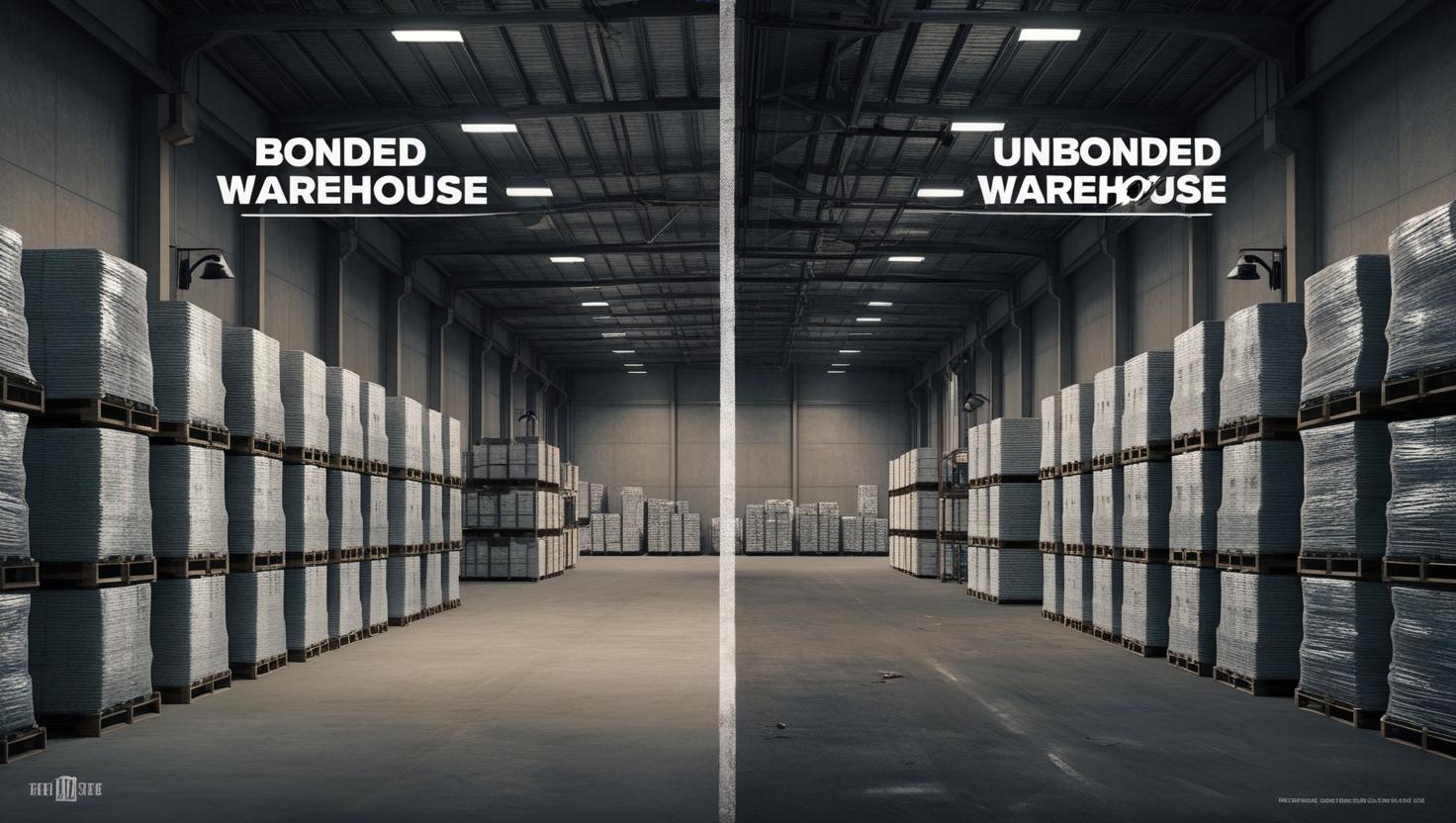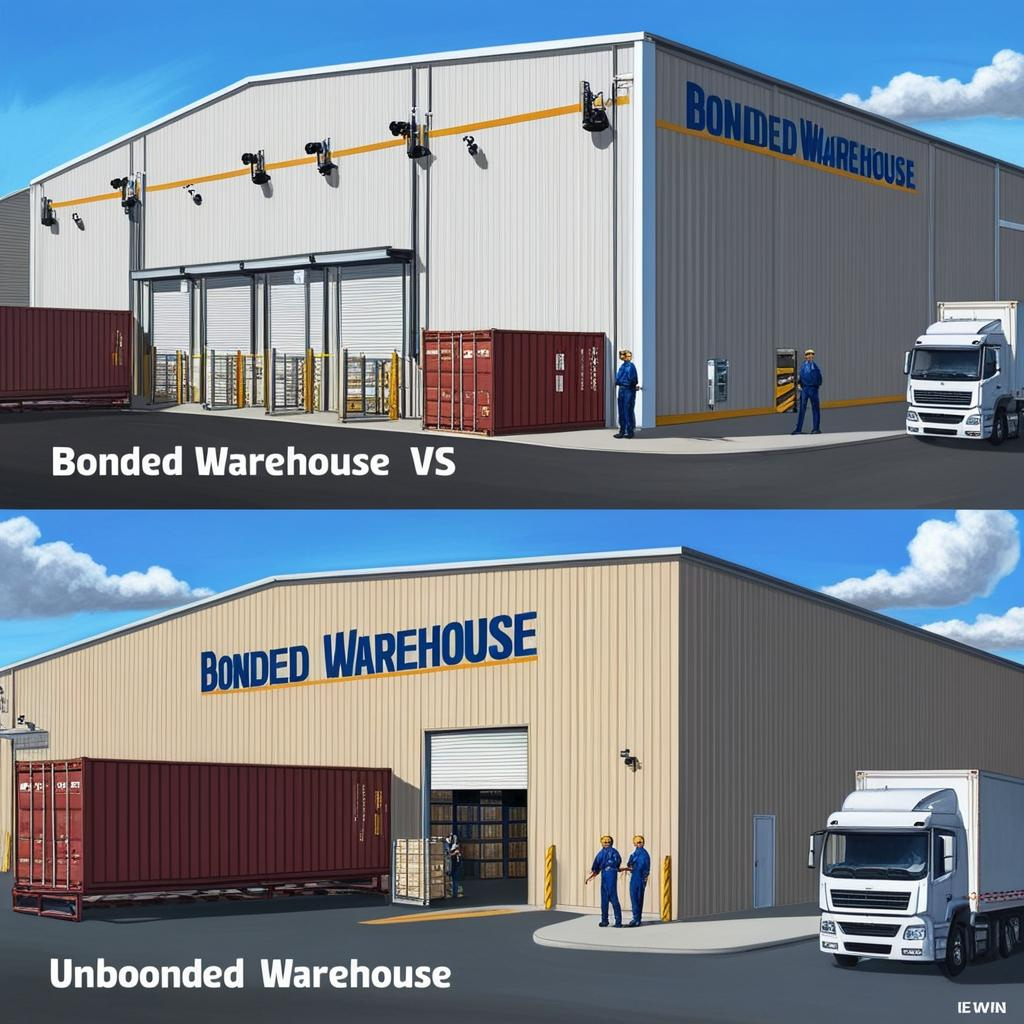Bonded Warehouse VS Unbonded Warehouse: A Full Guide

When you deal with international trade, understanding the distinction between a bonded storage warehouse and unbonded warehouses can significantly impact your operations. A bonded storage warehouse operates under customs supervision, offering benefits like delayed duty payments and extended storage durations. On the other hand, unbonded warehouses lack customs oversight, requiring immediate duty payments upon importation. This difference influences how you manage cash flow, compliance, and storage strategies.
Understanding Bonded Warehouses

What Is a Bonded Warehouse?
A bonded storage warehouse is a secure facility where imported goods can be stored without the immediate payment of customs duties. These warehouses operate under customs supervision, ensuring compliance with regulations. Businesses use bonded storage warehouses to defer taxes until goods are withdrawn for sale or consumption. This system is particularly beneficial for companies handling large volumes of imports or exports.
For example, customs bonded storage warehouses allow you to store goods for up to five years without incurring duties, reducing upfront costs. They also enable the storage of restricted goods without immediate paperwork approval. These features make bonded storage warehouses a strategic choice for businesses navigating complex import regulations.
Key Features of Bonded Storage Warehouses
Bonded storage warehouses offer several features that make them attractive to businesses:
Tax Deferral: Companies can delay VAT and duty payments, improving cash flow.
Cost Savings: Businesses using bonded warehousing report tax savings of 25-30%.
Storage Flexibility: Goods can be stored, manipulated, or even manufactured within the warehouse.
Market Growth: The bonded warehouse market is projected to reach $273.6 billion by 2031, reflecting its growing importance in global trade.
These features make bonded storage warehouses a strategic choice for businesses looking to optimize their supply chain and reduce costs.
Understanding Unbonded Warehouses
What Is an Unbonded Warehouse?
An unbonded warehouse is a storage facility that operates without customs supervision. Unlike bonded warehouses, these facilities require you to pay customs duties and taxes immediately upon importing goods. Unbonded warehouses are commonly used for storing goods intended for local distribution or retail purposes. They provide flexibility for businesses that do not need to defer tax payments or comply with customs regulations.
For example, if your business imports goods for immediate sale in the domestic market, an unbonded warehouse allows you to store and distribute them without additional customs procedures. This type of warehouse is ideal for companies focused on quick turnover and local market operations.
Key Features of Unbonded Warehouses
Unbonded warehouses offer several distinct features that cater to specific business needs:
Feature | Bonded Warehouse | Non-Bonded Warehouse |
|---|---|---|
Customs Supervision | Yes | No |
Tax/Duty Payment | Deferred | Immediate payment required |
Usage | Controlled by customs for specific goods | Freely used for retail and local distribution |
No Customs Oversight: You can store goods without customs intervention, simplifying operations.
Immediate Tax Payment: Duties and taxes must be paid upfront, which may impact cash flow.
Local Market Focus: These warehouses are ideal for businesses targeting domestic markets.
Unbonded warehouses provide a straightforward solution for companies that prioritize efficiency and local distribution over tax deferral benefits.
Comparing Bonded and Unbonded Warehouses
Customs Duties and Taxation
When choosing between bonded and unbonded warehouses, understanding customs duties and taxation is crucial. Bonded warehouses allow you to defer duty payments until goods are withdrawn for sale or consumption. This deferment can last up to five years, giving you greater control over cash flow and reducing upfront costs. In contrast, unbonded warehouses require immediate payment of all import duties and taxes upon arrival, which may strain your budget if you're handling large shipments.
Warehouse Type | Duty Payment Timing | Duty Payment Duration |
|---|---|---|
Bonded Warehouse | Deferment of duty payments | Up to five years |
Unbonded Warehouse | Immediate payment of all duties and fees | N/A |
This difference makes bonded storage warehouses ideal for businesses involved in international trade or export operations, while unbonded warehouses suit companies focused on local distribution.
Regulatory Oversight
Bonded warehouses operate under strict customs supervision. Customs officials inspect bonded goods upon arrival and monitor their storage to ensure compliance with regulations. This oversight allows you to store restricted items, such as alcohol or tobacco, without immediate approval. However, it also means you must adhere to customs protocols, which can involve additional paperwork and inspections.
Unbonded warehouses, on the other hand, function independently of customs authorities. Once you pay the required duties, you can store and distribute goods freely without regulatory intervention. This autonomy simplifies operations and speeds up the supply chain, making unbonded warehouses a practical choice for businesses prioritizing efficiency over compliance.
Storage Duration and Restrictions
Storage duration and restrictions vary significantly between bonded and unbonded warehouses. Bonded warehouses offer extended storage periods, allowing you to keep bonded goods for up to five years without paying duties upfront. This flexibility supports long-term planning and inventory management, especially for seasonal products or goods awaiting export.
Unbonded warehouses, however, require immediate payment of duties and taxes, limiting storage duration to your operational needs. These warehouses are better suited for businesses with quick turnover rates or those focused on local markets.
Warehouse Type | Storage Duration | Payment Requirement |
|---|---|---|
Bonded Warehouse | Payment of duties can be deferred | |
Unbonded Warehouse | Immediate payment of duties required | Duties and taxes must be paid immediately |
Bonded warehouses provide strategic advantages for businesses managing bonded goods over extended periods, while unbonded warehouses cater to companies seeking simplicity and speed.
Costs and Fees
When deciding between a bonded warehouse and an unbonded warehouse, understanding the associated costs and fees is essential. Each type of warehouse comes with unique financial implications that can significantly impact your business operations.
Bonded Warehouse Costs
Using a bonded warehouse involves specific fees tied to customs regulations and extended storage benefits. You may encounter costs such as:
Customs Bond Fees: A bonded warehouse requires a customs bond, which guarantees payment of duties and taxes. This fee varies based on the value of your goods.
Storage Charges: Bonded warehouses often charge for long-term storage. These fees depend on the duration and volume of goods stored.
Handling Fees: Customs inspections and documentation processes may incur additional handling charges.
Although these costs might seem higher upfront, the ability to defer duty payments can improve your cash flow. For example, storing goods in a bonded warehouse allows you to delay taxes until the goods are sold or exported, reducing immediate financial strain.
Unbonded Warehouse Costs
Unbonded warehouses typically have simpler fee structures. However, they require immediate payment of duties and taxes upon importation. Key costs include:
Duty and Tax Payments: Unlike bonded warehouses, unbonded facilities demand upfront payment of all import duties and taxes. This can tie up capital, especially for large shipments.
Storage Fees: These warehouses charge for storage based on the space and time required. The rates are often lower than those of bonded warehouses due to the absence of customs oversight.
Operational Costs: With fewer regulatory requirements, unbonded warehouses reduce administrative expenses, making them a cost-effective option for local distribution.
Comparing Costs
Cost Type | Bonded Warehouse | Unbonded Warehouse |
|---|---|---|
Duty Payment Timing | Deferred | Immediate |
Storage Fees | Higher due to extended storage options | Lower due to simpler operations |
Customs Bond Fees | Required | Not required |
Choosing the right warehouse depends on your business priorities. If you value cash flow flexibility and long-term storage, a bonded warehouse offers strategic advantages. However, if you prioritize simplicity and lower upfront costs, an unbonded warehouse may better suit your needs.
Tip: Evaluate your import volume, storage duration, and cash flow requirements before making a decision. This ensures you select the most cost-effective option for your business.
Benefits and Drawbacks of Bonded and Unbonded Warehouses
Advantages of Bonded Warehouses
Bonded warehouses provide significant benefits for businesses engaged in international trade. One of the most notable advantages is the ability to defer customs duties. You can store goods in bonded warehouses for up to five years without paying taxes upfront. This improves cash flow and allows you to allocate resources to other areas of your business.
Another advantage is the flexibility these facilities offer. Bonded warehouses allow you to store, repackage, or even process goods under customs supervision. This is particularly useful if you need to prepare products for export or adjust them to meet market demands. Additionally, bonded warehouses enable you to store restricted goods, such as alcohol or tobacco, without immediate regulatory approval.
These warehouses also support global trade by reducing financial risks. For example, if you decide not to sell certain goods domestically, you can re-export them without incurring duties. This feature makes bonded warehouses a strategic choice for businesses managing complex supply chains.
Disadvantages of Bonded Warehouses
Despite their benefits, bonded warehouses come with certain drawbacks. The most significant is the cost. Using bonded warehouses involves fees for customs bonds, inspections, and long-term storage. These expenses can add up, especially for small businesses with limited budgets.
Another challenge is the strict regulatory oversight. Customs officials monitor bonded warehouses closely, which means you must comply with detailed documentation and inspection requirements. This can slow down operations and increase administrative workload.
Additionally, bonded warehouses may not suit businesses focused on quick turnover. The customs processes involved can delay the movement of goods, making them less ideal for companies prioritizing speed and efficiency.
Advantages of Unbonded Warehouses
Unbonded warehouses offer simplicity and speed, making them ideal for businesses targeting local markets. Since these facilities operate without customs supervision, you can store and distribute goods without additional regulatory procedures. This reduces administrative tasks and accelerates your supply chain.
Another advantage is the lower cost. Unbonded warehouses typically charge less for storage since they do not require customs bonds or inspections. This makes them a cost-effective option for businesses with tight budgets.
Unbonded warehouses also provide flexibility for immediate distribution. Once you pay the required duties upon importation, you can freely access and move your goods. This is particularly beneficial for retailers and distributors who need to maintain a steady inventory flow.
Disadvantages of Unbonded Warehouses
While unbonded warehouses offer simplicity and speed, they come with several drawbacks that may impact your business operations. Understanding these limitations is crucial when deciding if this type of facility aligns with your needs.
Immediate Tax Burden: One of the most significant disadvantages is the requirement to pay customs duties and taxes upfront. This can strain your cash flow, especially if you handle large shipments or operate on tight margins. Unlike bonded warehouses, unbonded facilities do not provide the flexibility to defer these payments.
Limited Storage Flexibility: Unbonded warehouses lack the regulatory allowances that bonded facilities offer. You cannot store restricted goods, such as alcohol or tobacco, without completing all necessary customs formalities. This limitation reduces your ability to manage diverse inventory types.
No Export Benefits: If you plan to re-export goods, unbonded warehouses may not be the best choice. Once you pay duties upon importation, you cannot reclaim them, even if the goods are later exported. This increases your overall costs and reduces profitability for international trade operations.
Note: Businesses focused on global markets often find bonded warehouses more advantageous due to their tax deferral and export-friendly policies.
Higher Risk of Overhead Costs: Although unbonded warehouses typically have lower storage fees, the immediate tax payments and lack of duty recovery options can lead to higher overall expenses. This is particularly true for businesses managing high-value goods or large inventories.
Choosing an unbonded warehouse requires careful consideration of these disadvantages. If your business prioritizes cash flow flexibility, tax savings, or export operations, an unbonded facility may not meet your strategic goals.
Choosing the Right Warehouse for Your Business
Use Cases for Bonded Warehouses
Bonded warehouses are ideal for businesses involved in international trade. If you import goods in bulk and need to defer trariff, these facilities help optimize cash flow. They are also suitable for storing goods awaiting export, as you can avoid paying duties on items that leave the country.
For companies dealing with seasonal products, bonded warehouses provide long-term storage flexibility. You can store goods for up to five years without incurring immediate tax liabilities. Additionally, bonded warehouses are perfect for businesses handling restricted items. Customs supervision ensures compliance with regulations, allowing you to store goods like alcohol or tobacco without immediate approval.
Use Cases for Unbonded Warehouses
Unbonded warehouses work best for businesses focused on local markets. If you need to distribute goods quickly, these facilities streamline operations by eliminating customs oversight. Retailers and distributors often use unbonded warehouses to maintain inventory close to target markets, reducing delivery times and transportation costs.
These warehouses are also suitable for businesses with high turnover rates. If you import goods for immediate sale, unbonded facilities allow you to store and access inventory without delays. They are particularly beneficial for small businesses with limited budgets, as they avoid the additional costs associated with customs bonds and inspections.
How YQN Logistics Can Assist
YQN Logistics specializes in providing tailored solutions for businesses navigating the complexities of warehouse management. Whether you require bonded storage or unbonded facilities, YQN Logistics offers expertise to streamline your operations and optimize your supply chain. Contact info@yqn.com today for a free consultation!
Comprehensive Bonded Warehouse Services
Efficient Unbonded Warehouse Solutions
Tailored Support for Your Business
Tip: Partnering with YQN Logistics gives you access to industry-leading expertise and state-of-the-art facilities, ensuring your warehouse operations run smoothly and efficiently.
Bonded vs. Unbonded Warehouses: A Comparison Table
Below is a table summarizing the primary differences between these two storage options:
Aspect | Bonded Warehouse | Unbonded Warehouse |
|---|---|---|
Customs Supervision | Operates under customs control, ensuring compliance with regulations. | Functions independently without customs oversight. |
Duty Payment Timing | Duties are deferred until goods are withdrawn for sale or consumption. | Duties and taxes must be paid immediately upon importation. |
Storage Duration | Allows storage for up to five years, offering flexibility for long-term planning. | Storage duration depends on your operational needs, typically short-term. |
Goods Eligibility | Suitable for restricted goods like alcohol or tobacco under customs supervision. | Ideal for general goods intended for local distribution or immediate sale. |
Cost Implications | Involves customs bond fees, storage charges, and handling costs. | Lower storage fees but requires upfront duty payments, impacting cash flow. |
Export Benefits | Enables re-export without paying duties, reducing financial risks. | No duty recovery options for exported goods, increasing overall costs. |
Tip: If your business involves international trade or restricted goods, bonded warehouses provide strategic advantages. For local distribution or quick turnover, unbonded warehouses offer simplicity and cost-effectiveness.
Conclusion
Partner with YQN Logistics for expert guidance. Our tailored solutions ensure smooth operations, whether you need bonded or unbonded storage. Contact info@yqn.com today for a free consultation!
FAQ
What is the main difference between bonded and unbonded warehouses?
Bonded warehouses operate under customs supervision, allowing you to defer duty payments. Unbonded warehouses lack customs oversight, requiring immediate payment of duties upon import. This distinction impacts cash flow and compliance requirements.
How long can goods stay in a bonded warehouse?
You can store goods in a bonded warehouse for up to five years without paying duties. This extended storage period supports long-term inventory management and export planning.
Are bonded warehouses more expensive than unbonded warehouses?
Yes, bonded warehouses often involve higher costs due to customs bond fees, inspections, and extended storage options. However, they provide tax deferral benefits, which can offset these expenses for businesses managing large inventories.
See Also
Leveraging Bonded Warehouses to Lower US Tariffs in 2025
Three Essential Changes Cross-Border Sellers Should Understand About US Warehouses
Essential Strategies for Understanding Incoterms in 2025
Understanding SCAC Codes: Crucial Information for Every Shipper

Shipping with YQN - Global Logistics at Your Fingertips
YQN has established subsidiaries worldwide, covering North America, Latin America, Southeast Asia, and the Middle East. We have partnered with 300+ top shipping and airline companies and have access to 3500+ high-quality supplier resources. YQN also has a professional customer service and fulfillment team of over 500 people to provide more worry-free and efficient international logistics services.
Contact Us
You can also email us at info@yqn.com.

